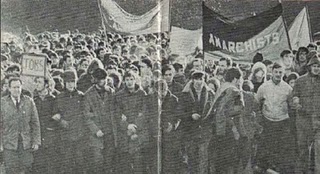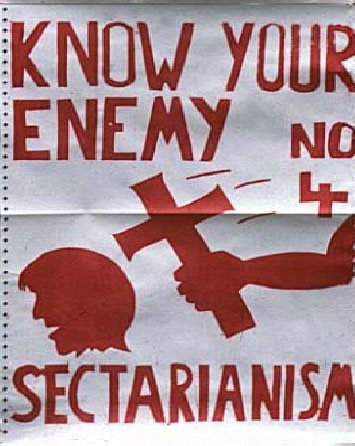Over 30 years of anarchist writing from Ireland listed under hundreds of topics
The History of Belfast anarchism

Historian Mairtin O Cathain’s ‘Wee Black Booke’ has now been added to our archive for you to read or download. In it he pulls together reports of anarchism in and around Belfast in the years from 1867 to 1973. With no local movement for much of this period, the pamphlet looks at some individuals whose political activity merited mention in the media of the time. O Cathain’s work stops before the emergence in the late 1970s of the groups from which contemporary anarchist organisations Workers Solidarity Movement and Organise! can trace their roots.
He pointedly finishes off by referring to the fact that the forces of ' British and Irish nationalism are still with us and are as potent as ever. Anarchists have our work cut out for us and many battles to fight, but fighting in the knowledge that we inherit the name and spirit of those working class militants who went before us under the banner of anarchy should encourage us, in Belfast or wherever else we ma y be found today.
y be found today.
Some readers will be aware of Captain Jack White who fought in the Irish Citizen Army and later became an anarchist after participating and witnessing the Spanish revolution in practice. Other names will be unknown to most mainstream historians and even anarchists including Bolton Hall and William Baillie who later emigrated to the USA. Hall was involved in communal experiments, propaganda, and union organising. Baillie was more of an individualist, though he still realised that “personal freedom was tied inexorably to co
anarchist after participating and witnessing the Spanish revolution in practice. Other names will be unknown to most mainstream historians and even anarchists including Bolton Hall and William Baillie who later emigrated to the USA. Hall was involved in communal experiments, propaganda, and union organising. Baillie was more of an individualist, though he still realised that “personal freedom was tied inexorably to co
 llective and economic freedom.”
llective and economic freedom.”
John McAra was a Scottish anarchist who came to speak in Belfast, where he was arrested and jailed. A small group emerged from his activity, but appears to have died away after the First World War. Jack McMullen was a public speaker with socialist with anarchist sympathies, who campaigned against slum housing and unemployment in the 1920s and 1930s.
Finally there is John McGuffin, a founder member of the Belfast Anarchist Group, who was involv ed in the early Peoples Democracy and the civil rights movement. The author also discusses the impact of the conflict here on the movement and the temporary stranglement of any viable non-sectarian class struggle alternative to the status-quo.
ed in the early Peoples Democracy and the civil rights movement. The author also discusses the impact of the conflict here on the movement and the temporary stranglement of any viable non-sectarian class struggle alternative to the status-quo.
As the author acknowledges in his book, 'We freely acknowledge the marginal status and relative unpopularity of the movement, though people’s misconceptions aboutanarchism have long been a difficulty in popularising it. It nevertheless has attracted a number of extraordinary people over the years from the late nineteenth to the late twentieth century, and the message, method and spirit of anarchism has rang out in the streets and halls of Belfast at times of great social radicalism and in periods of inveterate reaction.'
 This excellent pamphlet provides a small glimpse and snapshot of the history of belfast anarchism, a movement and tendency which still continues to grow spreading the gospel of independent working class self-management and direct action on the streets of Belfast and beyond.
This excellent pamphlet provides a small glimpse and snapshot of the history of belfast anarchism, a movement and tendency which still continues to grow spreading the gospel of independent working class self-management and direct action on the streets of Belfast and beyond.
Read the Wee Black Booke of Belfast Anarchism

